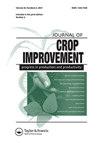生物炭和硫酸铝对盐碱地水稻生长和生产的影响
IF 1.5
Q3 AGRONOMY
引用次数: 0
摘要
土壤盐碱化是农作物生产的主要威胁。生物炭和硫酸铝作为土壤改良剂对提高盐碱条件下水稻的生产力至关重要。研究了盐碱化条件下稻壳生物炭和硫酸铝对水稻生长、生物量、产量和土壤性质的影响。试验在吉林农业大学的试验田进行。试验采用完全随机设计,设置5个生物重复,分别为T0(无生物炭、无硫酸铝、无氮肥)、T1(无生物炭、无硫酸铝、无氮磷钾)、T2(硫酸铝和NPK)、T3(生物炭和NPK)和T4(生物炭、硫酸铝和NPK) 5个处理。与T0相比,T1的株高、分蘖数、叶干重、穗干重、鞘干重、茎干重和总干生物量分别显著提高了14.67%、56.39%、60.13%、59.53%、39.00%、58.36%和55.99%。与T0相比,经T1处理,籽粒产量显著提高82.79%。此外,施用生物炭和硫酸铝显著降低了水稻各器官的Na+浓度,显著提高了K+浓度,从而提高了K+/Na+比值。此外,与对照相比,T1、T2、T3和T4处理显著提高了土壤pH、Ca2+、Mg2+、CO32-和Cl-浓度。因此,施用生物炭和硫酸铝可以缓解盐碱地的盐碱化胁迫,改善土壤健康,提高水稻产量。预计研究结果将有助于制定新的管理战略,以改善盐碱化条件下的水稻生产。本文章由计算机程序翻译,如有差异,请以英文原文为准。
Influence of biochar and aluminum sulfate on rice growth and production in saline soil
ABSTRACT Soil salinization is a major threat to crop production. Biochar and aluminum sulfate as soil amendments are critical for improving rice (Oryza sativa L.) productivity under saline-sodic conditions. This study explored the effects of rice-husk biochar and aluminum sulfate on rice growth, biomass, yield, and soil properties under saline-sodic conditions. The experiment was carried out in an experimental field located at the Jilin Agricultural University, China. Five treatments, viz., T0 (no biochar, no aluminum sulfate, no nitrogen), T1 (no biochar, no aluminum sulfate, with NPK), T2 (aluminum sulfate and NPK), T3 (biochar and NPK), and T4 (biochar, aluminum sulfate, and NPK), arranged in a completely randomized design with five biological replicates, were assessed. Compared to T0, plant height, tiller number, leaf dry weight, panicle dry weight, sheath dry weight, stem dry weight, and total dry biomass significantly increased by 14.67%, 56.39%, 60.13%, 59.53%, 39.00%, 58.36%, and 55.99%, respectively, with T1. Compared to T0, the grain yield significantly increased by 82.79% with T1. Additionally, biochar and aluminum sulfate applications significantly decreased the Na+ concentration in different rice organs and considerably increased the K+ concentration and consequently, the K+/Na+ ratio. Moreover, compared to the control, the soil pH, Ca2+, Mg2+, CO32-, and Cl- concentrations under T1, T2, T3, and T4 treatments were substantially improved. Therefore, biochar and aluminum sulfate applications can alleviate saline-sodic stress, improve soil health, and increase rice productivity on saline-sodic soils. The study findings are anticipated to help develop new management strategies for improving rice production under saline-sodic conditions.
求助全文
通过发布文献求助,成功后即可免费获取论文全文。
去求助
来源期刊

Journal of Crop Improvement
Multiple-
CiteScore
3.30
自引率
7.70%
发文量
42
期刊介绍:
Journal of Crop Science and Biotechnology (JCSB) is a peer-reviewed international journal published four times a year. JCSB publishes novel and advanced original research articles on topics related to the production science of field crops and resource plants, including cropping systems, sustainable agriculture, environmental change, post-harvest management, biodiversity, crop improvement, and recent advances in physiology and molecular biology. Also covered are related subjects in a wide range of sciences such as the ecological and physiological aspects of crop production and genetic, breeding, and biotechnological approaches for crop improvement.
 求助内容:
求助内容: 应助结果提醒方式:
应助结果提醒方式:


